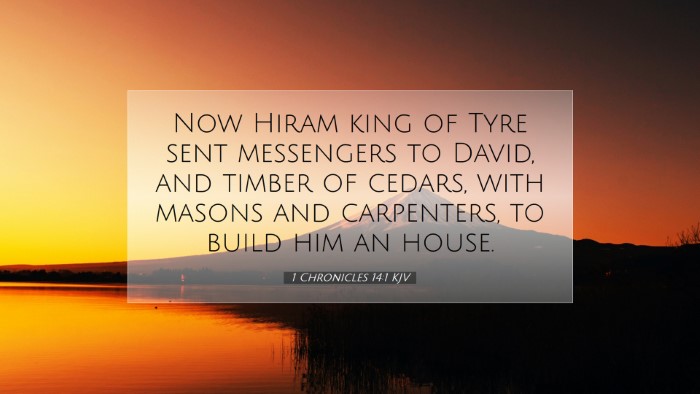Commentary on 1 Chronicles 14:1
1 Chronicles 14:1 states: "Now Hiram king of Tyre sent messengers to David, and timber of cedars with masons and carpenters to build him a house."
Introduction
This verse serves as a pivotal moment in the narrative of King David's reign. It highlights a significant alliance between David and Hiram, the king of Tyre, demonstrating not only political diplomacy but also the importance of divine favor in the establishment of David's kingdom.
The Alliance with Hiram
The mention of Hiram, who is portrayed as a notable and prosperous king, is indicative of a broader geopolitical context. His willingness to assist David in constructing a palace illustrates the recognition of David’s newfound status and authority.
- Political Recognition: David’s rise as king was met with acknowledgment from neighboring states, signifying the respect he commanded.
- Symbol of Unity: The partnership with Tyre symbolizes unity and mutual support among nations, presenting David as not just a military commander but as a principled leader.
The Significance of Cedar Timber
The choice of cedar wood for construction reflects both luxury and durability. Cedar, known for its aromatic and resistant properties, was a preferred material in ancient architecture, particularly in palaces and temples.
- Symbol of Majesty: The luxurious cedar signifies the majesty and splendor of King David's reign.
- Spiritual Implications: The use of high-quality materials can be seen as a prelude to the eventual construction of the Temple, which would be a dwelling for God among His people.
Cultural Implications
The collaboration between David and Hiram signifies a blending of cultures, where David, an Israelite, interacts positively with the Phoenicians. This highlights the potential for constructive relationships between the people of God and those outside the covenant community.
- Common Goals: The understanding that both leaders had common aspirations for prosperity reflects a diplomatic effort beyond warfare.
- Evangelistic Precedent: The narrative sets a precedent for how God's people can engage with others for mutual benefit, presenting a model for modern diplomatic relations.
The Role of Masons and Carpenters
The employment of skilled masons and carpenters is essential in understanding the craftsmanship that went into the construction of David's house. This shows the value of skilled labor and the integration of expertise in significant projects.
- Human Skill and Divine Purpose: The combination of divine favor and human skill emphasizes God's use of individuals in fulfilling His plans.
- Preparation for Future Endeavors: The palace serves as a preparation for David's future role in establishing a more permanent place of worship for God.
Theological Reflections
This scripture invites theological reflections on leadership, divine providence, and the role of nations in God's plans.
- Divine Favor Upon Leadership: The favor shown to David through Hiram’s assistance underscores God’s commitment to His anointed leaders.
- God’s Sovereignty in Alliances: The occurrences in the lives of such figures as David reveal the sovereign hand of God in the affairs of men.
Conclusion
1 Chronicles 14:1 encapsulates a moment rich in political, cultural, and spiritual significance. The materials and labor provided by Hiram to David highlight a community effort towards grandeur and express a harmonious relationship between God’s chosen leader and foreign allies. The implications extend into the realm of modern governance, inter-national relationships, and the overarching narrative of divine providence throughout history.


